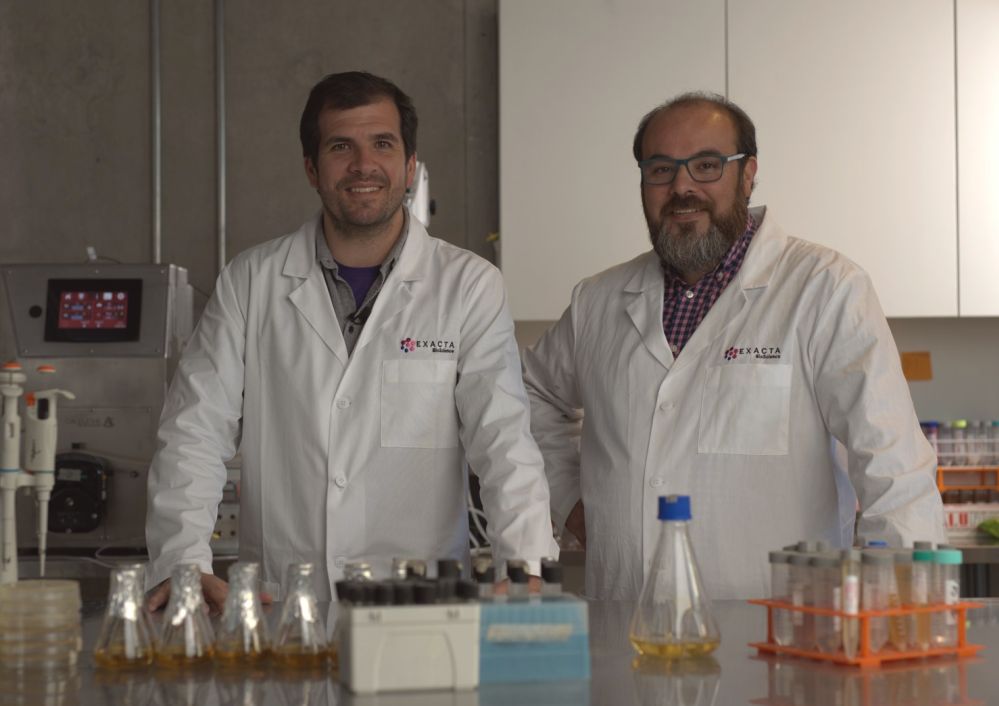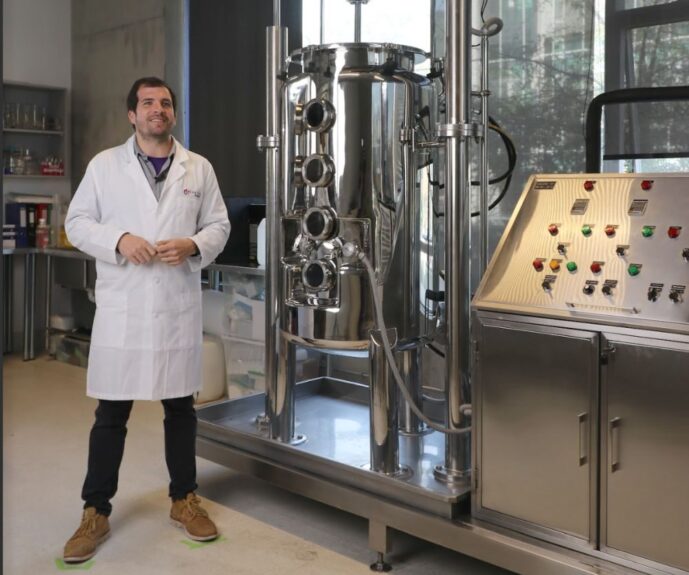From fungi to bacteriophages, ag biologicals (biologics) have been developed to tackle everything from fungal diseases to improving plants’ ability to utilize nutrients, says Santiago-based startup Exacta Bioscience. But many of them are not (yet) ready for prime time.
“Biologicals are getting better all the time, but there are still problems,” observes José Manuel Bustos Aguirre, an agronomist who joined Exacta as CEO and “late cofounder” in 2022 after five years with agribusiness KWS Group, where he headed up the sugar beet operation.
“At KWS, we had a long line of people trying to offer us biological products, we tested a whole array of them and always found the same issues. Some of the products were just not convincing, in other cases the formulations were not the same one year to the next, the mode of action wasn’t clear, and farmers were not convinced.
“But I met the guys from Exacta [cofounder Dr. Julio Retamales started the business in 2019 just before the pandemic hit] and we really clicked, because they shared my view that we can do this much better, both in terms of understanding the mode of action, but also in understanding that these products need a proper shelf-life.
“You can’t supply something with the shelf life of yogurt, that lasts two weeks and needs refrigeration. You need to have something that is going to work in a real-world environment at room temperature for long periods.”
Partnership with Ginkgo Bioworks: ‘It’s all about production efficiency’
But above all, he says, biologicals have to be scalable.
“Many of these products start great in the lab. But once you need [enough to apply to] 10,000 hectares, startups can choke,” adds Bustos Aguirre, who was speaking to AgFunderNews after teaming up with synthetic biology co. Ginkgo Bioworks to improve the production efficiency of the three bacterial strains in Exacta’s first commercial product, a biostimulant called FitoRoot.
“It’s all about production efficiency. We have set up a process for product development that sets us up for creating scalable products. Now that we have a commercial agreement with [crop protection company] Adama, we don’t want to fall in that trap that we get a big purchase order that we can’t cover.
“Right now we are set up for local demand, but the partnership with Ginkgo is to really make this product seamlessly transition from a local success to a global success. Ginkgo has the know-how, especially with these types of bacteria, and the equipment to really make this formulation bulletproof.”
FitoRoot, composed of three Bacillus strains, help crops better absorb water and nutrients such as phosphorus, and strengthens their defenses against abiotic stress. This in turn delivers improved crop health, yields and resistance to drought and extreme temperatures. Supplied as a liquid concentrate that can be added to irrigation water for crops including avocados, walnuts, cherries, potatoes, and tomatoes, it has an ambient shelf-life of at least 18 months.
Currently marketed in Chile, FitoRoot is expected to expand to other Latin American markets, says Bustos Aguirre. “We’re already selling in Chile and we have a five year contract with Adama Chile, which includes other Latin American countries.”

Bacteriophages
According to Bustos Aguirre: “The cool thing about Exacta, which came of of research conducted at Centro de Evaluaciones de Rosario (CER) [a sustainable agricultural research center south of Santiago] is that it is agnostic to the microorganisms, so we have some concepts that are bacteria-based, some that are viruses, and some that are fungi-based.
“What is most disruptive is the bacteriophage technology, viruses that attack bacterial disease. That’s where [CSO] Julio [Retamales] really has a lot of expertise. And that’s where we’re filing one of our first patents.
“Phages are viruses that destroy bacterial populations very specifically, and there are a series of bacterial diseases in different crops that are causing all sorts of problems,” adds Bustos Aguirre, who says such bacteria are typically controlled with copper or antibiotics, “which are not very sustainable solutions.”
He explains: “We are developing a product for Clavibacter michiganensis, a bacterium that attacks greenhouse tomato crops and can be quite devastating. If you have even two or three plants infected usually the whole greenhouse needs to be cleared out. We’re now in discussions with a third party to develop a bacteriophage-based product to attack this disease.”
Exacta is also looking at bacteriophages that can combat Pseudomonas syringae, a bacterial cancer that affects stone fruits and kiwi fruits; Xanthomonas arborícola, a bacterial blight impacting walnuts and hazelnuts; and citrus greening disease, which is devasting citrus plants in many parts of the world.
Business model
As it can take time to secure regulatory approvals for crop protection products that attack bacteria or fungi (as opposed to biostimulants, for example), Exacta’s business model involves working closely with partners on a project basis in order to generate cashflow while products are under development, says Bustos Aguirre.
“We work in partnership with agricultural firms such as Adama on a project basis. The idea is that we make a product that fits their portfolio. So we have a series of other products for different bacterial diseases that we’re discussing now with different partners. And once we have an agreement, we do a very accelerated development phase, so in 18 months, you have a product that’s been tested that works.”
He adds: “So we generate some cashflow during the project phase and then once we hit the market, we charge a lower royalty, maybe than we would have charged if we would have done it without this upfront charge. But it makes the whole system a bit more sustainable in terms of the financials.”
To date, the company has been funded by angel investors, but is now seeking seed funding that will give it around 18 months’ of runway, says Bustos Aguirre.
Changing attitudes to biologicals
Stepping back to look at the biologicals space today, he says, while many products still need some work, attitudes are changing. “There is now overall acceptance in the industry that biologicals are not just for organic production, they are part of the solution.
“We won’t convert to fully biological production in the short term, but I’ve visited a lot of farmers that are 60+years old, who five years ago would have said it’s impossible, and today are applying biostimulants and trying things out because they know the tools that they have today are not going to be there forever.”
Further reading:
Biologicals won’t replace chemical crop inputs anytime soon. Here’s why
Q&A w/ Bayer: ‘It would be detrimental to take chemical crop protection out of the toolbox’
Investing in ag biologicals: “We are looking for reasons to say no”





